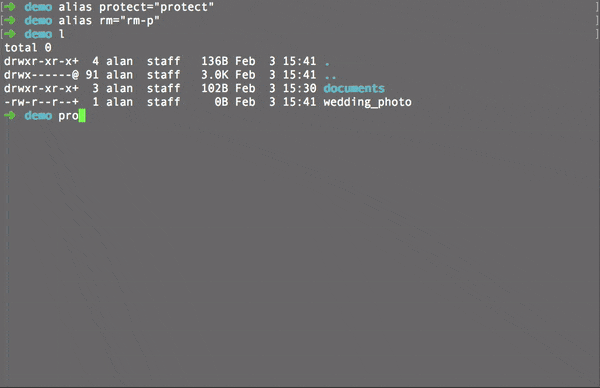A safe alternative for rm with minimum difference
Ports: See #ports
Wiki: https://github.com/alanzchen/rm-protection/wiki
rm-protection is a safe alternative for removing files. It works exactly the same as rm (in fact it passes arguments to rm almost untouched). The only difference is that it refuses to proceed if a .*.rm-protection file is found and you failed to answer a question.
I watched GitLab engineers trying to recover their production database live on YouTube.
Suddenly an idea struck me: What if rm prompted to ask "Which server are you on?" or "Which database are you trying to delete?"?
The disaster could have been avoided.
-
Install from PyPi and make an alias for
rm-p.pip install rm-protectionand optionally,alias rm="rm-p"for your daily user and root (so that it works forsudo). -
Protect your files using
protect. If you want to protect everything inside,protect -R. -
Happy rm-ing!
It consists of two utilities: rm-p and protect. The latter one is to help you protect files.
For example, you have a file called important_file and it is protected by .important_file.rm-protection. rm-p will recognize that important_file is protected and prompt to ask you a question stored in .important_file.rm-protection. rm-p will only proceed if you get the answer right.
See it in action:
It will also prevent you from deleting a directory with protected file(s) inside.
- Python 2 or 3
- Linux, unix and macOS
find
| Methods | Can be used as "rm"? | Protect Specific Files | Flexibility | Additional Files |
|---|---|---|---|---|
| trash-cli | Yes | Somehow | High | Centralised Config |
| rm -i | Yes | No or Somehow | High | |
| safe-rm | Yes | Yes | Low | Centralized Config |
| rm-protection | Yes | Yes | High | One for each |
rm-protection aims at providing maximum protection and flexibility while making minimum impact on daily operation.
rm -i can be very annoying, trash-cli is a bit complex (imagine you have a habit of emptying the trash without a second thought, or imagine you are trying to free up spaces on a budget vm). Safe-rm is inconvenient when you really need to delete something (you have to edit the configuration file).
Instead, rm-protection asks you a question set by you. You are fully covered when removing files (you won't accidentally empty the trash with trash-cli or | yes with rm -i), and you can quickly remove files (without editing any configuration files).
Pull requests and issues are all welcome! Or tell others about this, so you can even protect the files you send to others!
Actually I don't care if people are using my implementation at all. I just think this kind of mechanism can be great -- using a .rm-protection file that asks questions.
If the community welcomes this mechanism, it will soon be ported/rewritten in every platform or languages, or even be implemented in the GNU coreutils. Then you can even get some default protections shipped with distributions and packages.
So if you agree on this mechanism, please share with others!
-
rm-protection-c
rm-protectionimplemented in C by losfairCurrent only offers binaries for Linux, source code available for building in macOS and unix.
(Note that it may behave slightly differently from
rm-protectionand it has not been tested by me.)






